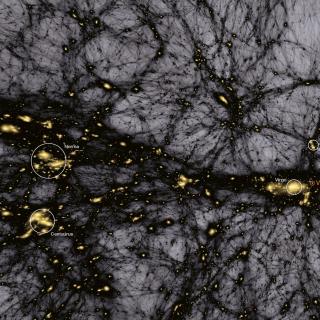Bibcode
García-Farieta, Jorge Enrique; Hortúa, Héctor J.; Kitaura, Francisco-Shu
Bibliographical reference
Astronomy and Astrophysics
Advertised on:
4
2024
Journal
Citations
5
Refereed citations
3
Description
Context. The new generation of galaxy surveys will provide unprecedented data that will allow us to test gravity deviations at cosmological scales at a much higher precision than could be achieved previously. A robust cosmological analysis of the large-scale structure demands exploiting the nonlinear information encoded in the cosmic web. Machine-learning techniques provide these tools, but no a priori assessment of the uncertainties.
Aims: We extract cosmological parameters from modified gravity (MG) simulations through deep neural networks that include uncertainty estimations.
Methods: We implemented Bayesian neural networks (BNNs) with an enriched approximate posterior distribution considering two cases: the first case with a single Bayesian last layer (BLL), and the other case with Bayesian layers at all levels (FullB). We trained both BNNs with real-space density fields and power spectra from a suite of 2000 dark matter-only particle-mesh N-body simulations including MG models relying on MG-PICOLA, covering 256 h−1 Mpc side cubical volumes with 1283 particles.
Results: BNNs excel in accurately predicting parameters for Ωm and σ8 and their respective correlation with the MG parameter. Furthermore, we find that BNNs yield well-calibrated uncertainty estimates that overcome the over- and under-estimation issues in traditional neural networks. The MG parameter leads to a significant degeneracy, and σ8 might be one possible explanation of the poor MG predictions. Ignoring MG, we obtain a deviation of the relative errors in Ωm and σ8 by 30% at least. Moreover, we report consistent results from the density field and power spectrum analysis and comparable results between BLL and FullB experiments. This halved the computing time. This work contributes to preparing the path for extracting cosmological parameters from complete small cosmic volumes towards the highly nonlinear regime.
Aims: We extract cosmological parameters from modified gravity (MG) simulations through deep neural networks that include uncertainty estimations.
Methods: We implemented Bayesian neural networks (BNNs) with an enriched approximate posterior distribution considering two cases: the first case with a single Bayesian last layer (BLL), and the other case with Bayesian layers at all levels (FullB). We trained both BNNs with real-space density fields and power spectra from a suite of 2000 dark matter-only particle-mesh N-body simulations including MG models relying on MG-PICOLA, covering 256 h−1 Mpc side cubical volumes with 1283 particles.
Results: BNNs excel in accurately predicting parameters for Ωm and σ8 and their respective correlation with the MG parameter. Furthermore, we find that BNNs yield well-calibrated uncertainty estimates that overcome the over- and under-estimation issues in traditional neural networks. The MG parameter leads to a significant degeneracy, and σ8 might be one possible explanation of the poor MG predictions. Ignoring MG, we obtain a deviation of the relative errors in Ωm and σ8 by 30% at least. Moreover, we report consistent results from the density field and power spectrum analysis and comparable results between BLL and FullB experiments. This halved the computing time. This work contributes to preparing the path for extracting cosmological parameters from complete small cosmic volumes towards the highly nonlinear regime.
Related projects

Cosmology with Large Scale Structure Probes
The Cosmic Microwave Background (CMB) contains the statistical information about the early seeds of the structure formation in our Universe. Its natural counterpart in the local universe is the distribution of galaxies that arises as a result of gravitational growth of those primordial and small density fluctuations. The characterization of the
FRANCISCO SHU
KITAURA JOYANES